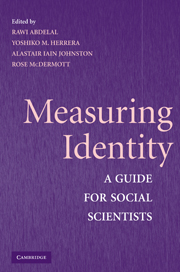Book contents
- Frontmatter
- Contents
- Contributors
- Introduction
- I DEFINITION, CONCEPTUALIZATION, AND MEASUREMENT ALTERNATIVES
- II SURVEY METHODS
- 4 Between Social Theory and Social Science Practice: Toward a New Approach to the Survey Measurement of “Race”
- 5 Balancing National and Ethnic Identities: The Psychology of E Pluribus Unum
- 6 Black and Blue: Black Identity and Black Solidarity in an Era of Conservative Triumph
- III CONTENT ANALYSIS AND COGNITIVE MAPPING
- IV DISCOURSE ANALYSIS AND ETHNOGRAPHY
- V EXPERIMENTS
- Bibliography
- Index
5 - Balancing National and Ethnic Identities: The Psychology of E Pluribus Unum
Published online by Cambridge University Press: 05 June 2012
- Frontmatter
- Contents
- Contributors
- Introduction
- I DEFINITION, CONCEPTUALIZATION, AND MEASUREMENT ALTERNATIVES
- II SURVEY METHODS
- 4 Between Social Theory and Social Science Practice: Toward a New Approach to the Survey Measurement of “Race”
- 5 Balancing National and Ethnic Identities: The Psychology of E Pluribus Unum
- 6 Black and Blue: Black Identity and Black Solidarity in an Era of Conservative Triumph
- III CONTENT ANALYSIS AND COGNITIVE MAPPING
- IV DISCOURSE ANALYSIS AND ETHNOGRAPHY
- V EXPERIMENTS
- Bibliography
- Index
Summary
INTRODUCTION
In a challenge to the ongoing American experiment of reconciling unity and diversity, Ernest Gellner (1983) called a multiethnic nation-state an oxymoron, arguing that minority groups ultimately would have to assimilate or secede. Using history to assess the validity of Gellner's claim that cultural unity is necessary for sustaining a sense of common national identity is difficult, however, given the slipperiness of key terms such as “culture” and “nation.” Does culture refer just to a common language or to a thicker layer of common understandings and, if so, just how thick? And does a sense of national identity mean an emotional attachment to one's homeland and everyone living there or a more bounded sense of solidarity with only those who share one's physical characteristics or cultural norms?
Despite the problems with testing Gellner's proposition, its contemporary relevance is obvious. Indeed, globalization and migration-driven multiculturalism are twin threats to Gellnerian nationalism and its institutional expression, the sovereign state. In the United States, ethnic identities have become more salient because of immigration, religious sectarianism, the development of linguistic enclaves, and the ideology of multiculturalism. At the same time, as the aftermath of September 11 shows, patriotic feelings continue to run very high (Huntington 2004).
One policy for achieving unity in the face of cultural diversity is forced assimilation, as with the aggressive “Americanization” program aimed at the immigrants of the early twentieth century. Another is to enshrine publicly a dominant national culture but leave minority groups alone; France has tended to follow this approach.
- Type
- Chapter
- Information
- Measuring IdentityA Guide for Social Scientists, pp. 145 - 174Publisher: Cambridge University PressPrint publication year: 2009
- 32
- Cited by



